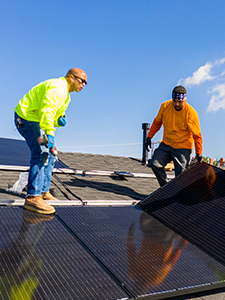Blog posted On July 27, 2022

Many parts of the world are experiencing extreme heat waves this summer. What are ways that we can help reduce the impact of heat waves at home?
Your state and the federal governments offer incentives and tax breaks for the use of renewable energy. Consider one of our Renovation Loans.
Studies show that adjusting your thermostat down three degrees in the cooler months and up three degrees in the warmer months will help reduce carbon dioxide emissions by about 1,050 pounds per year. You can also program your thermostat to adjust while you are sleeping or away from your home.
Replacing your light bulbs with LEDs not only helps your light bulbs lasts longer, but can also help you save money on your electric bills.
When replacing your current appliances be on the lookout for the Energy Star labels. You can find these labels on refrigerators, furnaces, air conditioners, freezers, and water heaters! Don’t be discouraged by the price tag – what you’ll end up saving will be worth it in the long run.
Tankless water heaters help save a lot of energy by only warming water as needed. Getting a tankless water heater installed can help you reduce your electric bill by almost $20 per month.
By reducing the use of hot water to do your laundry on just two loads of laundry, you can reduce carbon dioxide emissions by almost 550 pounds.
Doing your part at home in order to reduce gas emissions is a lot easier than people may realize – it can also save money!
One great way to get started is to reach out to one of your utility companies and see if they offer a free home energy audit. Then get your family involved and put the recommendations into practice together!
Source: National Park Service